
* Corresponding author
E-mail address:caturida_meiwanto_drm@mercubuana.ac.id (C. M. Doktoralina)
© 2019 by the authors; licensee Growing Science, Canada
doi: 10.5267/j.uscm.2018.10.010
Uncertain Supply Chain Management 7 (2019) 145–156
Contents lists available at GrowingScience
Uncertain Supply Chain Management
homepage: www.GrowingScience.com/uscm
The contribution of strategic management accounting in supply chain outcomes and logistic firm
profitability
Caturida Meiwanto Doktoralinaa* and Apollob
aFaculty of Economics and Business, Post Graduate of Management, Universitas Mercu Buana, Jakarta, Indonesia
bFaculty of Economics and Business, Post Graduate of Management, Universitas Mercu Buana, Jakarta, Indonesia
C H R O N I C L E A B S T R A C T
Article history:
Received September 10, 2018
Accepted October 25 2018
Available online
October 27 2018
In the current decade, with an increase in e-commerce, the logistics activities have grown rapidly.
However, the logistics industry of the Malaysian country is declining, as the ranking of this
industry has shown downfall continuously during the past few years. The decrease in logistics
industry performance reduces the contribution in a Gross Domestic Product (GDP). Therefore,
to address this issue, the primary objective of this study was to examine the role of strategic
management accounting practices to enhance the profitability of the Malaysian logistics firms.
Questionnaires were adopted to collect the primary data and they were distributed among the
employees of the logistics companies. All the questionnaires were distributed through area
cluster sampling technique. Partial least square (PLS) structural equation modelling (SEM) was
used to analyze the collected data. The results indicate that strategic management accounting
practices had a significant positive relationship with supply chain outcomes and supply chain
outcomes had a significant positive relationship with the profitability of the logistics companies.
Finally, this is one of the pioneer studies, which examined the impact of strategic management
accounting practices on the outcome of the logistics firms.
Canadaensee Growin
g
Science,
by
the authors; lic9© 201
Keywords:
Strategic management accounting
Supply chain, profitability
Logistic
Technology
Information
Government policy
1. Introduction
In the current decade, with an increase in e-commerce, the logistic activities have grown rapidly
(Hameed et al., 2018a, 2018b). The logistics industry is one of the most significant industries to boost
the nation's economy. It has a significant contribution in GDP of every country. However, this industry
is presently facing various issues, particularly in the Malaysia including high distribution rate, increase
in transit time and payment methods issues, etc. (Imran et al., 2019). World Bank Logistic Performance
Index (LPI) 2016 published a report on the performance of the logistics of various countries and
indicated that the Malaysian logistics industry performance decreased in recent years. The Malaysian
logistic industry ranking was 25 in 2014, however, in 2016 it was decreased to 32 out of 160 countries
(Karim et al., 2018). The decrease in ranking was due to low warehouse productivity and supply chain
performance. Fig. 1 shows the Asian Countries Logistic Performance Index. In 2014, the Malaysian
logistics industry ranking was at 25. Singapore was at the top with number 5 ranking. Myanmar faced

146
with the worst conditions and it was ranked 145. However, the Malaysian logistics industry
performance decreased to number 32 in 2016 from number 25 in 2014 (Karim et al., 2018). The
decrease in performance was due to the inferior supply chain activities.
Fig. 1. Asian Countries Logistic Performance Index
Source: State of Logistics Indonesia (2015)
As per the Malaysian Productivity Corporation (2015), efficiency in the transportation and storage
services grew 10.1% to RM 50,683 for each employee in 2014 from RM 46,051 for every employee in
the earlier year. Despite its large employment base, the warehousing demonstrated an especially
amazing change in labor cost with profitability grew by 10.7%, while work cost per employee grew
4.5%, and unit work cost was dropped by 5.4%. Indeed, the warehousing and services recorded the
most noteworthy growth level which was a sign that the industry was growing. However, the Malaysian
logistics industry ranking was decreased as compared to 2014. According to Fig. 1, Singapore
performed the best followed by Malaysia and Thailand while Myanmar was rated the worst in terms of
logistics performance. There are presently some evidences that the performance of Malaysian logistics
industry is decreasing, which also decreases the overall profit the entire industry. The decrease in
worldwide ranking has a negative consequence on the economy of the Malaysia. As the logistics
industry has a significant association with the economy of every country, the Malaysian government is
now focusing on various transportation activities and supply chain activities to boost this industry.
The transportation is the backbone of the Malaysian and global economy, encouraging international
trade, empowering financial exercises, and connecting makers and purchasers with business sectors,
products, materials and services. The advancement of transportation and capacity services sub-segment
will be a key factor in the effective development of the Malaysia's different financial sectors (Purnama,
2014; Wireko-Manu & Amamoo, 2017; Nazal, 2017; Taqi et al., 2018; Karim et al., 2018). However,
apart from these efforts, strategic management accounting can be used to boost supply chain outcomes
to enhance the profitability of logistics companies.
The term strategic management accounting has been in the management accounting literature for more
than a decade (Lord, 1996;
Nze, et al., 2016; Kimengsi & Gwan, 2017). Strategic management
accounting is one of the tools to enhance the profitability of every firm (Ward, 2012; Solomon, et al.,
2014; Jaya and Verawaty 2015; Angbre, 2016; Tanoos, 2017; Chowdhury, et al., 2018). It can
increase the output of operations which ultimately improves the overall performance. In progressively
dynamic environments the establishment of strategically applicable information is of dominant
importance to the formulation as well as the execution of business strategies (Dixon, 1993), particularly
in logistics companies. The accountants in logistics companies needed adaptability in the field of good
MYANMAR
LAOS
CAMBODIA
PHILIPPINES
INDONESIA
VIETNAM
THAILAND
MALAYSIA
SINGAPORE
145
131
83
57
53
48
35
25
5
RANKING

C. M. Doktoralina and Apollo / Uncertain Supply Chain Management 7 (2019)
147
strategic management and accountability (Castorena, et al., 2014; Dim & Ezeabasili, 2015; Suryanto,
2015; Wang & Lu, 2016; Rekarti & Doktoralina, 2017; Intezar, 2017; Suryanto et al., 2018). Strategic
management accounting is generally based on various elements. These elements include; use of
technology, use of effective information, and government policy. These elements are crucial to
operationalize strategic management accounting system. Therefore, in the current study, these elements
(technology, information, government policy) are taken as the key elements of strategic management
accounting system to boost supply chain outcomes and profitability of Malaysian logistic companies.
Therefore, the objective of the current study is to examine the role of strategic management accounting
practices to enhance the profitability of Malaysian logistic companies. In the current study three
independent variables were used, namely; technology, information and government policy. One
mediating variable, namely; supply chain outcomes and dependent variables, namely; logistic firm
profitability, as it is shown in Fig. 2.
Strategic Management
Accounting
Technology
Supply chain
outcomes
Logistics firm
profitability
Information
Government Policy
Fig. 2. The theoretical framework was showing the effect of strategic management accounting practices on
logistic firm’s profitability
Therefore, the current study is one of the attempts to boost logistics firm's profitability among
Malaysian logistic firms through strategic management accounting practices. None of the studies
formally documented the supply chain profitability through strategic management accounting practices.
Therefore, this is a pioneer study which examined the impact of strategic management accounting
practices on logistic company's operations.
2. Literature Review
Over the past two decades, strategic management accounting ideology was presented into the literature
as a seminal development. During this period, strategic management accounting came to importance
among other innovative methods designed to restore the decreasing relevance of management
accounting activities (AlMaryani & Sadik, 2012; Cinquini & Tenucci, 2007; Roslender & Hart, 2003;
Tillmann, 2002). At the first time, the term strategic management accounting was used by Simmonds
in the 1980s to identify and externally oriented tactic to the practice of management accounting
(Roslender & Hart, 2010).
Institute of Management Accountants defines management accounting as “the process of identification,
measurement, accumulation, analysis, preparation, interpretation, and communication of financial
information used by management to plan, evaluate, and control within an organization and to assure
appropriate use of and accountability for its resources.” It also includes the preparation of financial
reports for non-management groups such as shareholders, regulatory agencies, creditors, and different
tax authorities (Aziz, 2012). The definition of management accounting highlights what management
accountants do, more importantly, it emphases on why the management accounting strategies are
deployed.
Management accounting and strategic management are dependably parts of similar management.
Strategic management has a place at the strategic level while management accounting traditionally
belongs more or less in the tactical level (Simons, 1991). Management control frameworks cannot just

148
be utilized to control current procedures, yet additionally to define new systems, in the event that they
are utilized intelligently. The poor planning of strategic accounting supports supply chain operations in
logistics firm can increase the supply chain outcomes.
From Fig. 3, it could be seen that, though other management accounting procedures lay more attention
on cost decrease, management and control, execution assessment and item management, strategic
management accounting underlines significantly on strategic positioning. Strategic management
accounting consolidates data on clients, competitors and the market, which empowers a firm to increase
competitive advantage and increment its section of the overall industry. It has a direct impact on supply
chain activities which improves the outcomes (Oboh & Ajibolade, 2017). As outlined in Fig. 3, other
management accounting procedures are arranged towards inner practices of management accounting,
yet strategic management accounting contrasts from this introduction towards external practice
(Arowomole, 2000; Cinquini & Tenucci, 2007; Juras, 2014; Roslender & Hart, 2010). As demonstrated
by Okoye and Akenbor (2008), strategic management accounting is a type of management accounting
in which attention is set on data that identifies with external factors and in addition non-financial data
and inside produced data which influences the accuracy of supply chain outcomes. However, in this
process, enterprise risk management is important, moreover, political uncertainty cannot be neglected
(Maqbool et al., 2018).
Fig. 3. Strategic Management Accounting
Source: Oboh and Ajibolade (2017)
According to Martin (2016), management accounting is the broadest section of accounting and tax
accounting, financial accounting, managerial accounting and internal auditing. Fig. 4 shows all these
accounting components and shows how they are linked with each other. Management accounting is
extended in Fig. 4 to incorporate cost accounting, cost management, activity management and
investment management.
All these components in Fig. 4 have a significant relationship with supply chain activities which
influence on the outcomes of the supply chain. Tax accounting helps to identify the tax cost on the
supply chain. Internal auditing ensures the accuracy of the supply chain. Managerial accounting helps
to run activities smoothly. Moreover, cost management accounting has a significant relationship to
handle internal cost on supply chain activities. Additionally, investment accounting facilitates how
Management
Accounting
Practices
Other
Management
Accounting
Techniques
Strategic
Management
Accounting
Orientation
External
Orientation
Internal
Emphasis
Strategic
positioning
Market share
Emphasis
Strategic
positioning
Competitive
advantage
Performance

C. M. Doktoralina and Apollo / Uncertain Supply Chain Management 7 (2019)
149
much logistic company should invest in the supply chain process. Here, the risk management through
audit (Hameed et al., 2018b) is most crucial.
2.1 Technology
Apart from all these components, three elements have a major contribution to strategic management
accounting. These components are; technology, information and government policy. These elements
have a significant association with supply chain operations and supply chain operations have a
relationship with supply chain outcomes. Finally, this process enhances the logistics firm's profitability.
Keeping in mind the end goal to encourage the monetary execution and competitiveness of the firm, a
comprehensive fundamental framework is required for the supply chain. An ideal physical and data
innovation foundation incorporates a decent and effective framework. However, it requires strategic
management accounting. In strategic management accounting technology is one of the essential
element. Arowomole (2000) confirmed that innovation foundation affects in a huge way on country
advancement as it can possibly invigorate the foundation of new firms. Arowomole (2000) certified
that technology foundation affects in a noteworthy way on improvement as it can animate the
foundation of new firm's and floated the development of already existing ones. Technology which
manages application, helps firms programming in the preparing of data with the end goal of successful
and effective hierarchical management. This depends on the ideal arrangement of other infrastructural
offices remarkably stable power supply. Arowomole (2000) noticed that the effect of technology on
the SMEs is overpowering as it encourages fast making and correspondence of management choices
inside firms and to different foundations. All these technological benefits support supply chain
operations and in logistic firms which definitely support supply chain outcomes and enhances the
logistics firm's profitability.
Hypothesis 1: There is a significant positive relationship between technology and supply chain
outcomes.
2.2 Information
In the current business environment, many firms including logistic firms seek and rely on information.
This information is used to analyse and predict future decisions that would affect the logistic
performance. Soleman (2008) noted that information system which is part of information could affect
the organisation. Therefore, logistics firms must concern about the precise information that would
translate to logistic performance. Information has a central role in the strategic management accounting
system (Ward, 2012) which influences the supply chain practices. Timely and accurate information
which is the part of strategic management accounting system has the ability to enhance supply chain
operations. How much supply of product required, how much raw material required and how the supply
chain activities should be developed to insurance better customer services is generally based on timely
information.
In the strategic management accounting system, information generally has three main elements such as
accuracy, consistency and time (Aziz, 2012). Without these three elements, strategic management
accounting system will not be beneficial. This implies truthful and accurate information would support
the logistic firm managers in better decision-making in supply chain activities. Consistent information
means all the information should be the same at each level of organization. It means that the same
information should be provided to all managers, workers as well as top management. However, this
information should be provided timely to facilitate supply chain operations.
Hypothesis 2: There is a significant positive relationship between information and supply chain
outcomes.




![Tài liệu học tập Thực tập mô phỏng chiến lược [chuẩn nhất]](https://cdn.tailieu.vn/images/document/thumbnail/2025/20250716/vijiraiya/135x160/280_tai-lieu-hoc-tap-thuc-tap-mo-phong-chien-luoc.jpg)
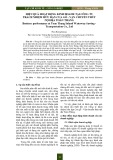
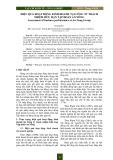
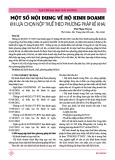
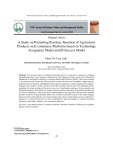
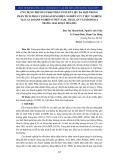








![Đề kiểm tra Quản trị logistics [mới nhất]](https://cdn.tailieu.vn/images/document/thumbnail/2025/20251015/2221002303@sv.ufm.edu.vn/135x160/35151760580355.jpg)
![Bộ câu hỏi thi vấn đáp Quản trị Logistics [năm hiện tại]](https://cdn.tailieu.vn/images/document/thumbnail/2025/20251014/baopn2005@gmail.com/135x160/40361760495274.jpg)






